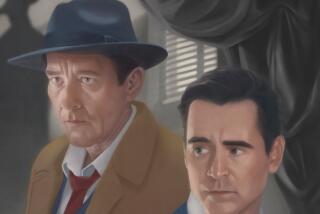Private Investigation of a Mystery Man
- Share via
Often called the father of “hard-boiled” crime fiction, Dashiell Hammett wrote such classics as “The Maltese Falcon” and “The Thin Man” during the 1920s and ‘30s, creating iconic characters Sam Spade and Nick and Nora Charles. A longtime companion of playwright Lillian Hellman, Hammett was jailed briefly during the McCarthy era for refusing to answer questions regarding left-wing group the Civil Rights Congress.
The 21st century is seeing a flurry of Hammett-related publishing, including the “Selected Letters of Dashiell Hammett,” edited by Richard Layman with Hammett granddaughter Julie M. Rivett. She lives in Orange County near her mother, Josephine Hammett Marshall (whose own memoir of Hammett is scheduled for publication this fall). We spoke with Rivett recently about family history.
*
Wasn’t your family unable to reprint Hammett’s work for a time?
When my grandfather died [in 1961], he owed a great deal of money in back taxes. His literary rights went up for auction. Lillian Hellman bought those rights for $5,000. My mother managed to gain control over the five novels through a negotiated agreement with Hellman’s trustees. To print the letters, we had to have permission from the trustees.
*
Did he and your grandmother remain married?
There was a paper divorce in the ‘30s, a Mexican mail-order divorce. He and she were always friendly; there are letters to her all the way up into the ‘50s. To get pension benefits, she petitioned the VA as a widow, and her claim was upheld.
*
Hammett had bought a house for her in L.A.?
Toward the end of World War II, when housing was very difficult, he provided the down payment. They bought the house in Mary’s [Hammett’s other daughter, now deceased] name. That little house on Purdue in West L.A. is where we found a lot of letters from my grandfather to my grandmother: a dozen from 1921, and another 20 or so from the ‘20s, talking about the Black Mask [magazine] days. Real love letters, from before they were married.
*
He spent time in Hollywood working on movie scripts and stories. What was that like?
Hollywood was difficult for him: too much money, no foundation in morality or reality. He would drink heavily. There are some really touching letters to Lillian Hellman in the ‘30s, where he was out here and partying too much. It was a way to make money, not a work of love.
*
What picture of Hammett emerges through his letters?
I think most people have the Dash and Lily image, or the drunk and hard-boiled writer. There’s a lot more. One thing that comes through is this gentleness. He was very affectionate and caring. The spirit of the man is quite different from what people expect.
More to Read
Sign up for our Book Club newsletter
Get the latest news, events and more from the Los Angeles Times Book Club, and help us get L.A. reading and talking.
You may occasionally receive promotional content from the Los Angeles Times.








